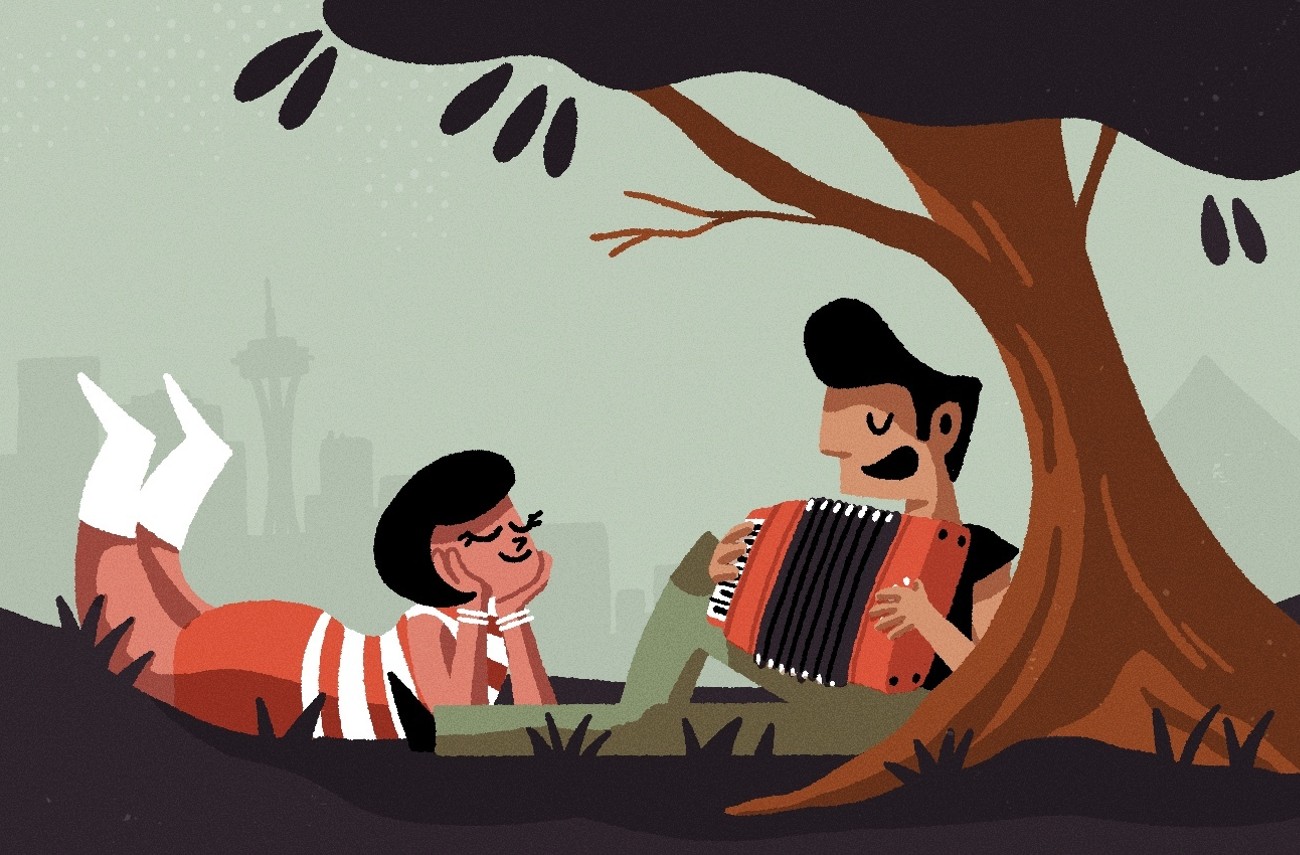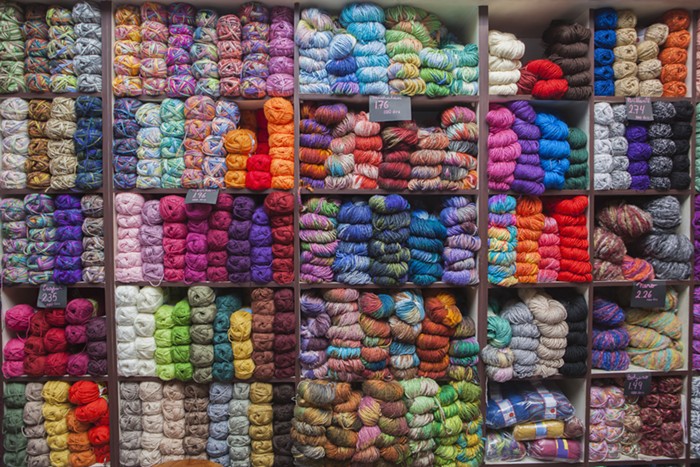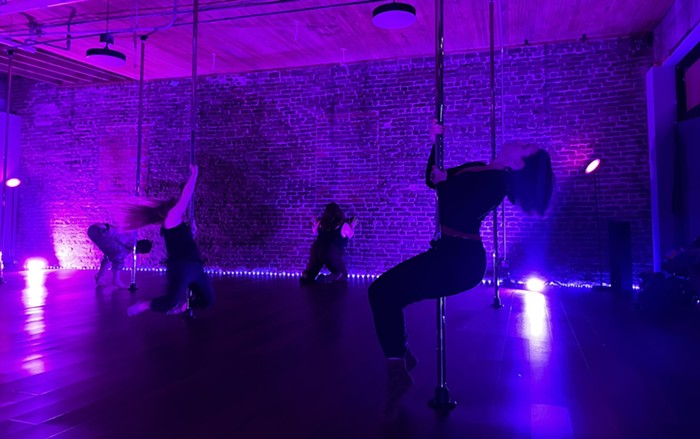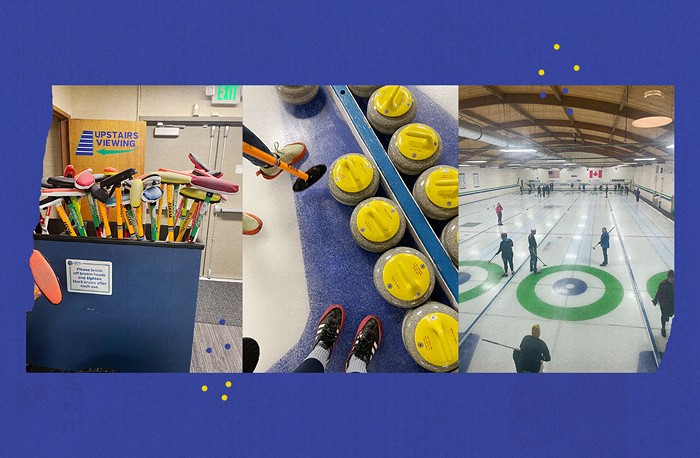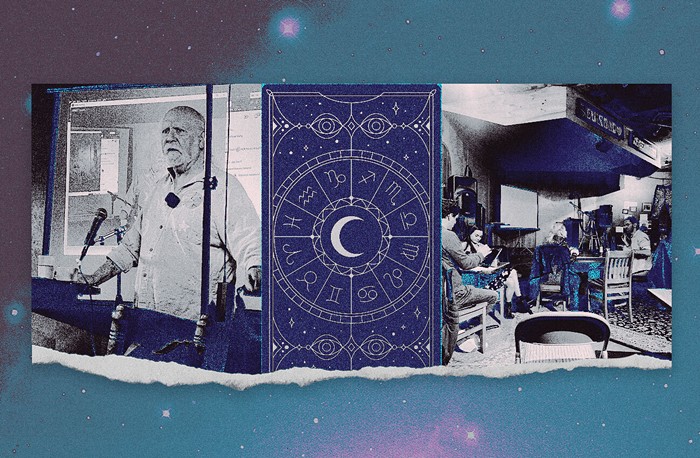When I heard about the Seattle Accordion Social, a monthly meetup on Beacon Hill for accordionists and accordion appreciators, I called the event’s co-director, John Giuliani, 71, on his landline (he only has a landline, he’s very clear about this) as he was on his way to a gig.
Giuliani told me he didn’t have a ton of time to chat. I had called at the end of September, otherwise known as Oktoberfest season. This is a big time for the accordion and for accordionists because of the polka of it all. But, the polka-focused social in October wouldn’t capture the essence of the club, according to Giuliani. The best time to come would be November, when the “Three Viches” performed. All of their last names ended in “Vich,” they were all Slavic, they were all related, they were the crème de la crème of Seattle accordionists. It was going to be quite the event, Giuliani said.
Okay, I said. I’ll show up then. For my latest exploration into Seattle’s subcultures, I did.
On the first Sunday in November, I pushed open the door to St. Mark's Lutheran Church. I followed a twisting beige hallway into the church’s beige multipurpose room, where three accordionists, Mike Marinkovich, John Morovich, and Andy Mirkovich—“The Three Viches”—would play for two hours.
I don’t know what I expected from this afternoon. My experience with the accordion was limited. I anticipated a weird, entertaining time and a lot of old people. Instead, I found a place where people can live in a memory for two hours every month. I spent those two hours fighting tears and succumbing to chills. However, I was right about the number of old people.
The Seattle Accordion Social, part of the Northwest Accordion Association, happens on the first Sunday of every month except in July and August. (Don’t get this confused with the Tacoma Accordion Social, which happens on the second Sunday of every even month, or the Sequim Accordion Social, which happens on the second Sunday of every odd month. They trade off so everyone can go to as many accordion socials as possible). The Seattle Accordion Social has been socializing for nearly 30 years.
Each social spotlights featured accordionists. The accordionists' styles differ from month to month, ranging from polka to Celtic to Slavic to Brazilian, and so on. Before the performers play, the social hosts an open mic for any accordionist to play a ditty. According to Charlene Sanderson, 74, the co-director of the Seattle Accordion Social, they “don’t always have someone for it.” If accordionists want to play, they must supply their own squeeze box and music stand.
Most of the attendees are in their 70s, though there are some people in their late 20s and early 30s, Sanderson told me.
Sanderson likes the accordion because her older sister and younger brother played. She started attending the socials when she was dating Giuliani. They’re just really good companions now.
Sanderson took me around the room, showing me the poster board of information about the performers she puts together for each social. She also lays out pictures and letters from young accordion students looking to qualify for the social’s annual scholarship. Last year they raised $400. Attendees can enjoy coffee with powdered creamer before the show, and cookies and homemade treats at the “snack” intermission.
“The socials are important because we want to keep the accordion—it’s a living thing—alive,” Lynne Clark, a board member of the Sequim Accordion Social, said. “We want more people in it, more younger people to come to it.” When I asked her age, Clark scoffed and said she was “old enough to be your grandmother.”
Rage, Rage Against the Dying of the Accordion
“Interest in accordion is diminishing as people pass on,” Sanderson said.
Because of the complexity of the instrument, to really understand the accordion, the technique needs to be passed down person to person.
The instrument, a technical contraption consisting of an up-and-down piano keyboard on one side, a bellows in the middle, and a series of buttons for the bass notes on the other side, used to be so popular that there were door-to-door accordion salesmen, one attendee told me. But then the 1960s happened, Elvis came on the scene with that dastardly guitar, and the accordion lost its luster.
“I’ve been working to further the accordion for 20 to 30 years,” Bonnie Birch, who said her age was a secret, told me. (She told me later that she was 80 and that people should re-evaluate their perception of 80-year-olds because “we’re a lot younger than people think.”)
Birch, who runs the Northwest Accordion Society, started playing the accordion when she was six, but she stopped when she went to the University of Washington in the 1960s and started working on computers. She traded accordion keys for computer keys for 30 years, only picking the instrument back up when she retired.
Now, Birch plays accordion at Ristorante Picolinos in Ballard every Friday night. On Saturdays, she goes up to Anacortes and plays at her friends’ Italian restaurant. “They’re very Italian and I’m Italian,” Birch said. She wore three beaded necklaces, each one a different color of the Italian flag. It was intentional.
For Birch and her generation, the instrument is a tradition. She hopes to keep it alive.
Isaac Lewis, 16, kicked off the event by performing during the open mic segment. He said he was going to play “Crazy Train.” The whole gray and white-haired audience seemed confused until Lewis added, “By Ozzy Osbourne.” The audience murmured. The reedy, windy sound of the accordion swelled in its interpretation of '80s metal. The crowd nodded along, pleased.
Lewis, who started playing the accordion two years ago because he likes "Weird Al" Yankovic, has been to six socials. He’s performed at three.
"It’s kinda sad because it’s a lot of fun, but all the kids are like, ‘Accordion? That’s weird,'" Lewis said. "It kinda sucks that they’re missing out on it. The accordion is good music. It’s not mainstream, but it’s still good."
While the socials breathe life into the accordion, the accordion breathes life into the bellows of a whole generation’s memories.
Music as Memory
The first performer and youngest “Vich,” Mike Marinkovich, learned accordion from his uncle, Andy Mirkovich, the day’s headliner. Marinkovich played a variety of songs of different styles, such as a French medley of “Just Because” and “The River Seine,” and some polka hits. When he introduced the polka songs, he asked the audience, “Have you guys heard of polka before?” The audience laughed. An accordion inside joke!
Throughout Marinkovich’s set, the audience tapped their toes lightly and patted their thighs in tune with the songs. As he played “The Happy Wanderer,” a popular polka song, everyone softly sang, trilling the name “Valerie” and then bellowing out a bopping descent of “bah, bah, bahs.” Tears sprang to my eyes as I felt the collective joy in the room.
For this generation of people, hearing this type of music brings them back to their childhoods, Sanderson said. It’s the music they grew up with.
“You sit and watch their faces,” she said. “You see them singing along with the music because they know all the lyrics. It just gets you.”
Clark stood up from her seat and moved to the back of the room, finding a partner along the way. They started to dance.
Clark told me the accordion reminded her of dancing with her husband in a Sonoma, California Little Switzerland dance hall. The two met folk dancing. Accordion music brings her back to those days when her husband persuaded her to play hooky from her job as a teacher. She’d hop onto his motorcycle with his button box—a style of accordion without piano keys—strapped on the back. She laid on the sand at Bodega Bay while he played. One time, a man strolled up to compliment the playing. It was her superintendent, Clark laughed.
Her husband, who she was married to for more than 38 years, died two years and five months ago.
Others danced, too. Ken McCauley, 73, danced with his wife in the church’s kitchen during a slower song. McCauley said he only got into the accordion when his wife started playing after she retired. “That’s when the trouble started,” he said. “She also taught me how to dance so she’d have a dance partner.”
McCauley grumbled out his begrudgements in jest. He loves this community. “I’ve never had this many friends before,” he said. He gathered autographs of all the performers for me so I could have a special keepsake.
Marinkovich closed with “La Vie en Rose,” the song he and his wife chose as their first dance at their wedding. He dedicated the performance to his wife, but also to his uncle Mirkovich and Mirkovich’s wife, Mary. They played “La Vie en Rose” at their wedding first.
“La Vie en Rose”
Mirkovich, the closer, is 83 years old. He’s been playing accordion for 78 years. He started playing the accordion by accident when, at five years old, he asked his Croatian immigrant parents for a music box for Christmas. He wanted an organ grinder, but his parents assumed “music box” meant accordion. The rest is history.
Every song he played at the social he’d never played in front of an audience before—most of the songs were from operas or musicals.
Before one song, he asked the audience: “Have you ever heard a song that when you hear it it has an emotional impact on you? This is that song for me. It happened the first time I heard it. It’s happened”—his voice cracked— “every time that I’ve heard it. And through all the years, it’s been a constant. But, I have to tell you, in the last three years or so”—his voice pitched up with emotion—“it’s had a huger impact on me because of what the song is all about. I lost my dear wife, Mary, almost three years ago now. Yet, I feel her presence every day.”
The song, from the musical, Carousel, was “You’ll Never Walk Alone.”
A soft smile played on his lips while he played. His fingers skated over the keys, themselves characters in the act. Every breath he took seemed to mirror the accordion, as if he and the instrument shared a pair of lungs. His eyes turned glassy. His smile never faded.
Mirkovich told me Mary was his number one fan. She always asked him to leave the door open when he practiced in the den. She had a specific spot on the couch where she would sit and listen. After she passed, Mirkovich was preparing for a concert when he thought of her. He opened the door, and then he went a step further and sat on the couch in her spot. He then played Mary’s favorite song, “La Vie en Rose.” It was the song he played for her at their wedding.
“In that living room, on the mantle, I have her ashes, I have a picture of her on either side of the ashes, I have a crucifix and I have a candle,” Mirkovich said. “When I finished playing the song, I turned around and the candle was lit.” His breath shuddered. “It took my breath away,” he said, voice breaking again, “still when I talk I get emotional. It was lit. It hadn’t been lit for years!”
When he plays, he thinks of Mary. They were married 57 years.
After that, I asked Mirkovich and Giuliani if they could teach me accordion. They strapped Marinkovich’s 28-pound accordion around me while I sat on a chair, securing it behind the chair with Giuliani’s belt (“I’m not undressing,” he promised, as he fastened the belt to the straps).
I only half focused on the instructions while I tugged the bellows apart, squeaking out horrible sounds. In reality, I couldn’t shake Mirkovich’s loss. Through his story and his music—the solemn, mournful keening of the accordion—I felt his heartbreak, and his love. Giuliani walked me through playing “Row, Row, Row, Your Boat,” but all I was thinking about was one day facing an empty spot on my own couch, a blank space in my own bed, and not having someone to read the drafts of these stories to—my own version of practicing the accordion.
Life is so much scarier when you have something—someone—worth losing. That’s why, I thought, reflecting on that audience full of septuagenarians and octogenarians—a group of people well-acquainted with loss—you need to gather up all the memories you can and enjoy the ones you have.
It’s why Mirkovich keeps playing. It's why Clark dances.
“He’s here with me,” Clark said of her late husband. “You never walk alone.”
Want more of this story and Play Date? Check out this episode of KUOW's Seattle Now podcast.
Any ideas on which Seattle subculture I should explore next? Want me to tag along with you on your favorite hobby or pastime? Send me tips at playdate@thestranger.com.
